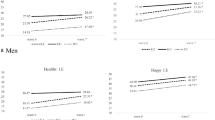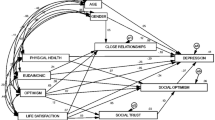Abstract
Unlike developed countries, we find a bell-shaped curve for the average frequency of depressive symptoms from the Indonesian Family Life Survey where the same people are followed over 14 years (2000–2014). This incidence is at a high level around the age of 60 and lower for younger and older people. If we may assume that a high incidence of depressive symptoms goes together with a low average of mental health then we may conclude that the average mental health is at at a low level around 60 and higher for younger and older people (U-shape). In addition, we provide evidence for the first time that positive future expectations of one’s physical health significantly reduces incidence of depressive symptoms after accounting for reverse causality. This is however contingent on gender as optimistic health expectation is effective for male but not for female. This effect is also more pronounced for those 60 years and below as well as urban residents. However, the association of health optimism with incidence of depressive symptoms weakens with age. Results from this paper show that a focus on rural/urban residency, younger and older age cohorts and gender can provide targeted social policies to effectively promote better mental health.

Source: Computed from IFLS3, IFLS4 and IFLS5

Source: Computed from IFLS3, IFLS4 and IFLS5
Similar content being viewed by others
Notes
According to Saucier and Goldberg (1998), Extraversion reflects the individual's determination, leadership, enterprising and activeness; Agreeableness reflects the individual's cooperation with others, tolerance and trust to others; Openness reflects the individual's creativity, innovation and curiosity; Conscientiousness reflects the individual's sense of accomplishment and hard work; and Neuroticism reflects the individual's self-doubt, pessimism and inability to withstand stress.
Although the coefficient of the interaction term of health expectations and age is positive, it is very small. For instance, taking the first derivative to find the effect of health expectations at age 80 equals to -0.562 + (0.002 X 80) which is -0.366. That is, the effect of health expectations has declined for CESD from 0.562 to 0.366 for an individual aged 80.
References
Ahadi, B., & Basharpoor, S. (2010). Relationship between sensory processing sensitivity, personality dimensions and mental health. Journal of Applied Sciences, 10(7), 570–574.
Amudhan, S., Gururaj, G., Varghese, M., Benegal, V., Rao, G. N., Sheehan, D. V. et al. (2020). A population-based analysis of suicidality and its correlates: findings from the National Mental Health Survey of India, 2015–16. The Lancet Psychiatry, 7(1), 41–51.
Andresen, E. M., Malmgren, J. A., Carter, W. B., & Patrick, D. L. (1994). Screening for depression in well older adults: Evaluation of a short form of the CES-D. American Journal of Preventive Medicine, 10(2), 77–84.
Ang, S. (2018). Social participation and health over the adult life course: Does the association strengthen with age? Social Science & Medicine, 206, 51–59.
Bell, R. A., Kravitz, R. L., Thom, D., Krupat, E., & Azari, R. (2002). Unmet expectations for care and the patient-physician relationship. Journal of General Internal Medicine, 17(11), 817–824.
Bertoni, M., & Corazzini, L. (2018). Asymmetric affective forecasting errors and their correlation with subjective well-being. PLoS ONE, 13(3), e0192941.
Brockmann, H. (2010). Why are middle-aged people so depressed? Evidence from West Germany. Social Indicators Research, 97(1), 23–42.
Brunnermeier, M. K., & Parker, J. A. (2005). Optimal expectations. American Economic Review, 95(4), 1092–1118.
Cao, J., & Rammohan, A. (2016). Social capital and healthy ageing in Indonesia. BMC Public Health, 16(1), 1–14.
Chen, Y., Bennett, D., Clarke, R., Guo, Y., Yu, C., Bian, Z. et al. (2017). Patterns and correlates of major depression in Chinese adults: a cross-sectional study of 0.5 million men and women. Psychological Medicine. 47, 958–970.
Conversano, C., Rotondo, A., Lensi, E., Della Vista, O., Arpone, F., & Reda, M. A. (2010). Optimism and its impact on mental and physical well-being. Clinical Practice and Epidemiology in Mental Health, 6, 25–29.
Curran, P. J., Obeidat, K., & Losardo, D. (2010). Twelve frequently asked questions about growth curve modeling. Journal of Cognition and Development, 11(2), 121–136.
de Grip, A., Lindeboom, M., & Montizaan, R. (2012). Shattered dreams: The effects of changing the pension system late in the game. The Economic Journal, 122(559), 1–25.
Easterlin, R. A. (2001). Income and happiness: Towards a unified theory. The Economic Journal, 111(473), 465–484.
Fahmi, M., Panjaitan, N. A., Habibie, I., Siregar, A. Y., Amarullah, G., & Sunjaya, D. K. (2019). Does your neighborhood protect you from being depressed? A study on social trust and depression in Indonesia. BMC Public Health, 19(1), 1–8.
Ferrari, A. J., Somerville, A. J., Baxter, A. J., Norman, R., Patten, S. B., Vos, T., & Whiteford, H. A. (2013). Global variation in the prevalence and incidence of major depressive disorder: A systematic review of the epidemiological literature. Psychological Medicine, 43(3), 471.
Fluharty, M., Bu, F., Steptoe, A., & Fancourt, D. (2021). Coping strategies and mental health trajectories during the first 21 weeks of COVID-19 lockdown in the United Kingdom. Social Science & Medicine, 279, 113958.
Frijters, P., Liu, A. Y., & Meng, X. (2012). Are optimistic expectations keeping the Chinese happy? Journal of Economic Behavior & Organization, 81(1), 159–171.
Hu, Y., Li, P., & Martikainen, P. (2019). Rural-urban disparities in age trajectories of depression caseness in later life: The China Health and Retirement Longitudinal Study. PLoS ONE, 14(4), e0215907.
Knight, J., & Gunatilaka, R. (2010). Great expectations? The subjective well-being of rural–urban migrants in China. World Development, 38(1), 113–124.
Kovess-Masféty, V., Alonso, J., de Graaf, R., & Demyttenaere, K. (2005). A European approach to Rural—Urban differences in mental health: The ESEMeD 2000 comparative study. The Canadian Journal of Psychiatry, 50(14), 926–936.
Li, J. S., & Ma, W. J. (2017). Prevalence and influencing factors of depression symptom among middle-aged and elderly people in China. Chinese Journal of Public Health, 33, 177–181.
Lincoln, K. D. (2008). Personality, negative interactions, and mental health. Social Service Review, 82(2), 223–252.
McIntosh, A. M., Stewart, R., John, A., Smith, D. J., Davis, K., Sudlow, C. et al. (2016). Data science for mental health: a UK perspective on a global challenge. The Lancet Psychiatry, 3(10), 993-998
McPhillips-Tangum, C. A., Cherkin, D. C., Rhodes, L. A., & Markham, C. (2018). Reasons for Repeated Medical Visits Among Patients with Chronic Back Pain. Journal of General Internal Medicine, 13(5), 289–295.
Miller, D. L., Scheffler, R., Lam, S., Rosenberg, R., & Rupp, A. (2006). Social capital and health in Indonesia. World Development, 34(6), 1084–1098.
Nizeyumukiza, E., Pierewan, A. C., Ndayambaje, E., & Ayriza, Y. (2021). Social Capital and Mental Health among Older Adults in Indonesia: A Multilevel Approach. Journal of Population and Social Studies, 29, 1–14.
Olshansky, S. J., Passaro, D. J., Hershow, R. C., Layden, J., Carnes, B. A., Brody, J. et al. (2005). A potential decline in life expectancy in the United States in the 21st century. New England Journal of Medicine, 352(11), 1138–1145.
Payne, C., Hedberg, E. C., Kozloski, M., Dale, W., & McClintock, M. K. (2014). Using and interpreting mental health measures in the National Social Life, Health, and Aging Project. Journals of Gerontology Series B: Psychological Sciences and Social Sciences, 69((Suppl_2)), S99–S116.
Probst, J. C., Laditka, S. B., Moore, C. G., Harun, N., Powell, M. P., & Baxley, E. G. (2006). Rural-urban differences in depression prevalence: Implications for family medicine. Family Medicine, 38(9), 653.
Raudenbush, S. W., & Chan, W. S. (1992). Growth curve analysis in accelerated longitudinal designs. Journal of Research in Crime and Delinquency, 29(4), 387–411.
Riumallo-Herl, C. J., Kawachi, I., & Avendano, M. (2014). Social capital, mental health and biomarkers in Chile: Assessing the effects of social capital in a middle-income country. Social Science & Medicine, 105, 47–58.
Salk, R. H., Hyde, J. S., & Abramson, L. Y. (2017). Gender differences in depression in representative national samples: Meta-analyses of diagnoses and symptoms. Psychological Bulletin, 143(8), 783. https://doi.org/10.1037/bul0000102
Sarkisian, C. A., Hays, R. D., & Mangione, C. M. (2002). Do older adults expect to age successfully? The association between expectations regarding aging and beliefs regarding healthcare seeking among older adults. Journal of the American Geriatrics Society, 50(11), 1837–1843.
Saucier, G., & Goldberg, L. R. (1998). What is beyond the Big Five? Journal of Personality, 66, 495–524.
Schwandt, H. (2016). Unmet aspirations as an explanation for the age U-shape in wellbeing. Journal of Economic Behavior & Organization, 122, 75–87.
Senik, C. (2004). When information dominates comparison: Learning from Russian subjective panel data. Journal of Public Economics, 88(9–10), 2099–2123.
Senik, C. (2008). Is man doomed to progress? Journal of Economic Behavior & Organization, 68(1), 140–152.
Skevington, S. M., & McCrate, F. M. (2012). Expecting a good quality of life in health: assessing people with diverse diseases and conditions using the WHOQOL‐BREF. Health Expectations, 15(1), 49–62.
Sujarwoto, S., Tampubolon, G., & Pierewan, A. C. (2019). A tool to help or harm? Online social media use and adult mental health in Indonesia. International Journal of Mental Health and Addiction, 17(4), 1076–1093.
Sutin, A. R., Terracciano, A., Milaneschi, Y., An, Y., Ferrucci, L., & Zonderman, A. B. (2013). The trajectory of depressive symptoms across the adult life span. JAMA Psychiatry, 70(8), 803–811.
Tampubolon, G., & Hanandita, W. (2014). Poverty and mental health in Indonesia. Social Science & Medicine, 106, 20–27.
Tampubolon, G., & Maharani, A. (2017). When did old age stop being depressing? Depression trajectories of older Americans and Britons 2002–2012. The American Journal of Geriatric Psychiatry, 25(11), 1187–1195.
Umberson, D., Chen, M. D., House, J. S., Hopkins, K., & Slaten, E. (1996). The effect of social relationships on psychological well-being: Are men and women really so different? American Sociological Review, 837–857. https://doi.org/10.2307/2096456
Wang, H., Cheng, Z., & Smyth, R. (2019). Consumption and Happiness. Journal of Development Studies, 55(1), 120–136.
Wang, S., Lu, T., Sun, J., Huang, L., Li, R., Wang, T., & Yu, C. (2023). Long-term trends in the incidence of depressive disorders in China, the United States, India and globally: A comparative study from 1990 to 2019. Frontiers in Psychology, 13, 1066706.
World Health Organization (2015). Update of the Mental Health Gap Action Programme Guidelines for Mental, Neurological and Substance Use Disorders, 2015. Geneva: World Health Organization. Available in https://pubmed.ncbi.nlm.nih.gov/26937539/
Yang, Y., & Lee, L. C. (2010). Dynamics and heterogeneity in the process of human frailty and aging: Evidence from the US older adult population. Journals of Gerontology Series b: Psychological Sciences and Social Sciences, 65(2), 246–255.
Zhang, Y., & Harper, S. (2022). The impact of son or daughter care on Chinese older adults’ mental health. Social Science & Medicine, 306, 115104.
Zhao, L., Han, G., Zhao, Y., Jin, Y., Ge, T., Yang, W. et al. (2020). Gender differences in depression: evidence from genetics. Frontiers in Genetics, 11, 1145. https://doi.org/10.3389/fgene.2020.562316
Funding
We are supported by Guangdong Planning Office of Philosophy and Social Science, with the Grant Number: GD23XGL002.
Author information
Authors and Affiliations
Corresponding author
Ethics declarations
Conflict of interest
The authors declare that they have no conflict of interest.
Additional information
Publisher's Note
Springer Nature remains neutral with regard to jurisdictional claims in published maps and institutional affiliations.
Rights and permissions
Springer Nature or its licensor (e.g. a society or other partner) holds exclusive rights to this article under a publishing agreement with the author(s) or other rightsholder(s); author self-archiving of the accepted manuscript version of this article is solely governed by the terms of such publishing agreement and applicable law.
About this article
Cite this article
Fan, S., Mahadevan, R. How Important is Optimism for Mental Health? A Spatial Temporal Life Course Analysis on Indonesia. Applied Research Quality Life 19, 135–154 (2024). https://doi.org/10.1007/s11482-023-10234-4
Received:
Accepted:
Published:
Issue Date:
DOI: https://doi.org/10.1007/s11482-023-10234-4




